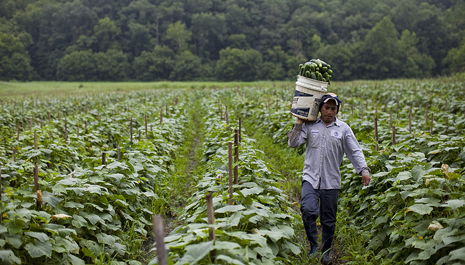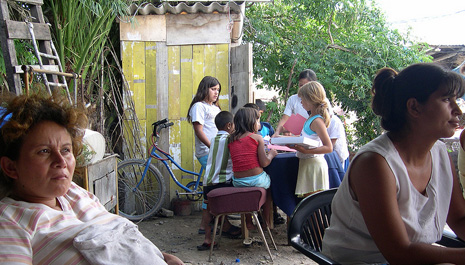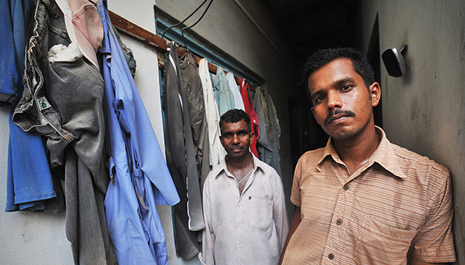Events
(listed with links to text)
2025
- 27 May: URGENT CALL issued today: Uphold Refugee & Migrant Health as a Global Public Health Priority by a broad array of health and other organizations including GMPA. The call reads:
" At this critical moment for global health, with the changing geopolitical and funding environment when those most vulnerable are at risk of being left behind, we therefore call on governments and global health leaders to:
• Ensure health systems are equipped to address the public health challenges of migration and displacement, supported by robust research and evidence-based policy.
• Recognize migrants and refugees as integral to the health systems of many high-income countries.
• Monitor and mitigate the health and development impacts of shifting migration policies.
• Maintain or increase support for migration and health and ensure that it remains a priority in the global health agenda, including within WHO.”
The call is now posted on this website here as well as elsewhere. Take action: Sign the Joint Call as an organisation, or Support as an individual. - New! 24 May: World Health Assembly side event on 2030 Global Agenda for Sepsis; Making the Next Success Story in Global Health. The side event highlighted the 2030 Global Agenda for Sepsis, intended to catalyze transformative actions to reduce sepsis incidence and mortality –targetting saving 2 million lives by 2030, through political leadership, strengthening health systems, R&D, and more effective prevention and management of Sepsis. The 2030 Global Agenda for Sepsis is the 1st global strategy to reduce the incidence of Sepsis affecting 50 million children, women, and men annually, to reduce sepsis mortality –estimated as high as 20 million persons every year, and to improve health outcomes from Sepsis. More than 70 stakeholders and Sepsis survivors from 6 geographic regions engaged in elaborating the Global Agenda. Sepsis accounts for 20% of deaths worldwide, notably of 2.9 million children and 5.1 million persons from NCDs (non-communicable diseases). 78% of COVID-19 patients in ICUs (intensive care units) had viral Sepsis. Patrick Taran, GMPA President, presented a comprehesive brief on SEPSIS – migrant and refugee risks and determinants require specific responsive approaches demonstating that migrants and refugees worldwide are major populations at risk of sepsis, notably in the world of work. Recent ILO data indicated that 253 million workers worldwide suffered workplace injuries annually, while disaggregated data where obtained has shown that foreign born/migrant workers suffer on-the-job injury and mortality rates twice as high as those of native-born workers. See provisional edition of the brief and Linkedin post.
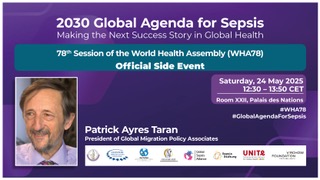
- New! 21 May: HRC Working Group on the issue of human rights and transnational corporations and other business enterprises : CSO consutation on its forthcoming thematic report titled “Labour Migration, Business and Human Rights” (online) attended by GMPA Associate Jane Aeberhard-Hodges.
- New! 28-29 April: Operationalizing Living Wages – a Global event on living wages under the auspices of Global Coalition on Social Justice, at ILO in Geneva, attended by GMPA Associate Jane Aeberhard-Hodges.
2024
- 28-29 November: GMPA team attended the biannual UN Forum on Minority Issues at the Palais des Nations in Geneva and engaged in ‘bilateral’ topical information exchange and networking consultations with various CSO representatives.
- 25-27 November: GMPA team participated and took active part in discussions at the 2024 annual UN Forum on Business and Human Rights held at the Palais des Nations in Geneva. Associates Jane Hodges and Olga Kadysheva participated in the sessions and circulated the GMPA brief Business & Human Rights - Context Briefing Note: Today’s Challenges of Migration, Economic Viability, Decent Work, Development. In oral remarks at the session preparing the migration and business working group report to the 2025 session of the UN General Assembly, Jane emphasized the importance of application of the normative foundation –namely the ICRMW and ILO Conventions 97and 143 for addressing protection and decent work for migrant workers.
- 21-22 October: GMPA Team participated in the Beijing+30 UNECE Regional Review Meeting “Reviewing 30 years of Beijing Commitments to Accelerate Gender Equality in the UNECE Region” organized by the United Nations Economic Commission for Europe (UNECE) and UN Women Regional Office for Europe and Central Asia (ECARO) at the Palais des Nations, that brought together participants from 56 Member States, civil society, youth, academia, and experts across the UNECE region. (see Linkedin post here)
- Listen to Jane Aeberhard-Hodges, GMPA Associate and former ILO Gender Equality Director explaining what GMPA is doing as a partner of the Global Coalition for Social Justice (one of a series of partner activity profiles). The Coalition is convened by the ILO, bringing together more than 300 partners from governments, employers’ and workers’ organizations, international institutions, enterprises, civil society organizations, and academic institutions.
- GMPA co-organised with Jusoor International for Media and Development 'Unveiling refugee stories, media & advocacy tactics', 28 June, 18h-20h, at University of Geneva-Uni Mail.

- May/June 2024. IPU-Inter-Parliamentary Union just launched a set of podcasts on parliaments and health issues. Podcast 3 on the role of parliaments in addressing health of migrants features Patrick Taran, President Global Migration Policy Associates and Yvonne Apiyo Brändle-Amolo, Delegate for Migration, Swiss Socialist Party interviewed by Senator Lorraine Clifford-Lee, Parliament of Ireland and Chair of the IPU Advisory Group on Health.
- GMPA Associates Jane Aeberhard-Hodges (former ILO Gender Equality Director) and Olga Kadysheva (GMPA Secretary) attended Inaugural Forum of the Global Coalition for Social Justice. GMPA is a partner of the Coalition since April 2024. The Forum was held on 13 June 2024, during the 112th Session of the International Labour Conference at the Palais des Nations in Geneva. The programme of the Inaugural Forum highlighted specific actions taken by partners to promote Social Justice. Watch the recordings on the Forum. The Coalition is led by the ILO and unites more than 300 partners from governments, employers’ and workers’ organizations, international institutions, enterprises, non-governmental organizations, and academic institutions. The mission of the Coalition is to foster multilateral cooperation and accelerate progress toward the Sustainable Development Goals (SDGs), championing social justice on a global scale. The Coalition leverages a century of ILO experience to generate political commitments, investments, and concrete actions. Together, Coalition partners amplify the scale and impact of initiatives, reinforcing processes dedicated to advancing the 2030 Agenda for Sustainable Development.

- 30 May: GMPA welcomed a group of LLM students in International Law from Keele University, UK, visiting international institutions and organisations during a study trip to Geneva. We were glad to provide an overview of key trends, issues and challenges in international migration as well as in migration governance, and to speak about the normative framework and key international conventions on the protection of migrants' rights. See post here.

- Patrick Taran, GMPA President, spoke at the side-event [to the 55th session of the UN Human Rights Council] on: Combating Global Racism: Implementing the Durban Declaration and Programme of Action, on 25 March at Palais des Nations in Geneva. See speaking text. GMPA was among the co-organisers of the side-event.
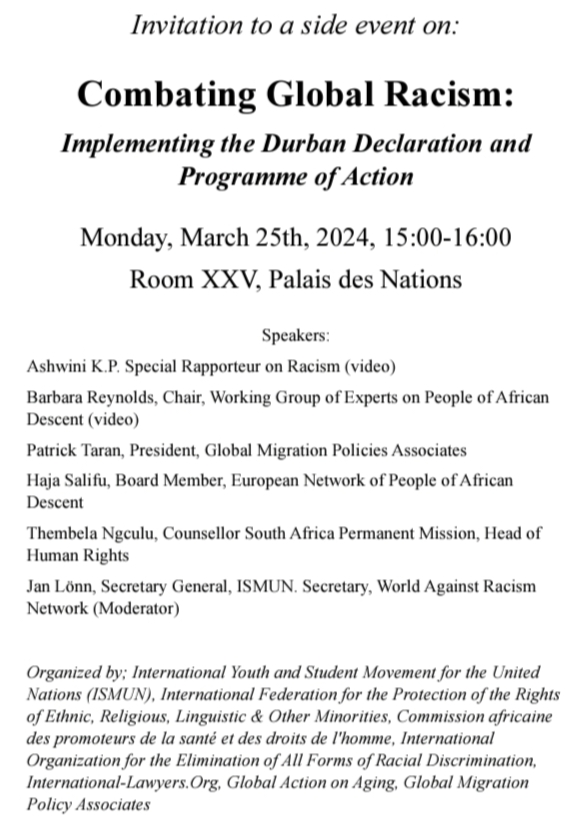 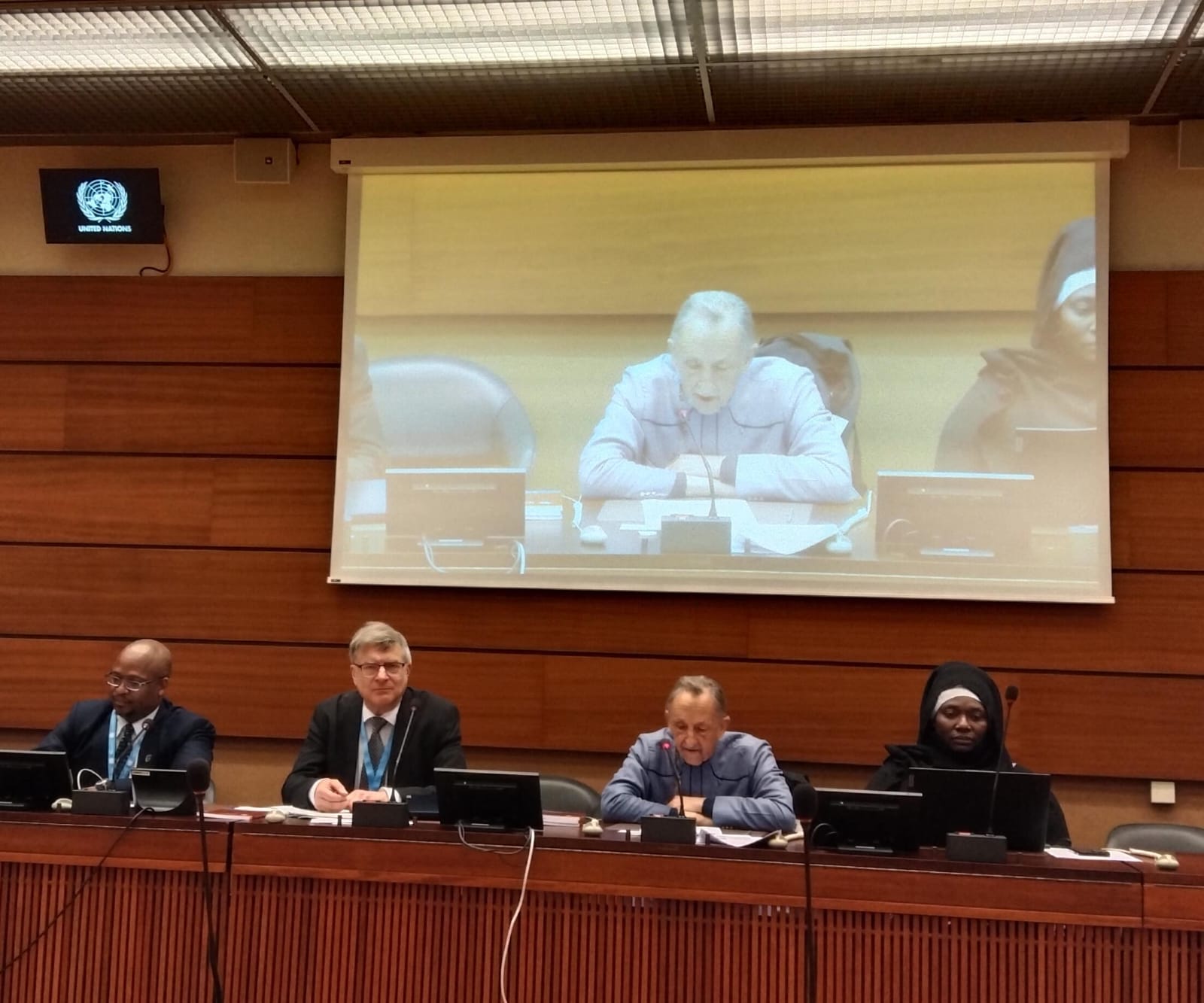 |
- A GMPA team participated in the Symposium on AI and Citizenship; 25 Years of ICV on 22 March in Geneva. The program featured a Thematic Conference on Artificial Intelligence, Democracy and Citizenship and a Round table: Reflection on AI, Ethics and Human Rights. Patrick Taran, GMPA President, moderated the latter (see photos here and here).
2023
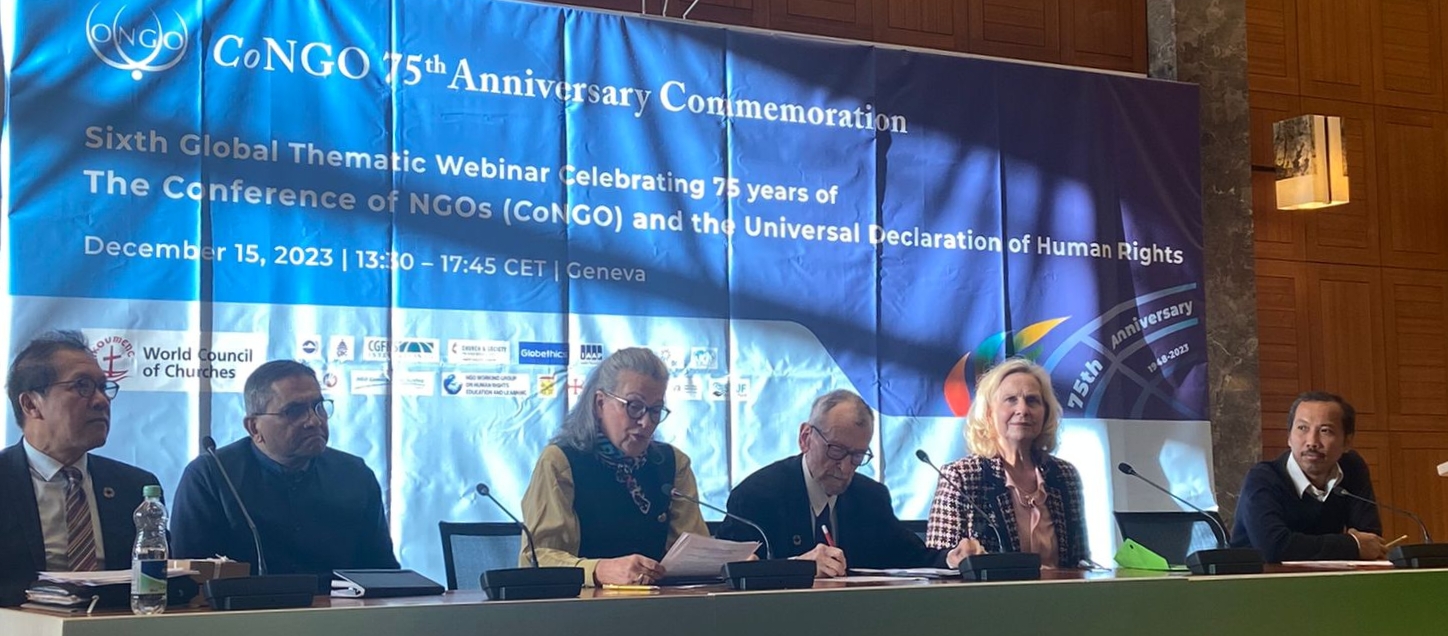
- 15 December: Jane Aeberhard-Hodges, GMPA Associate, former ILO Gender Equality Director, spoke on Human rights in the context of the 75th anniversaries of the UDHR and the Freedom of Association as a fundamental human right at CoNGO 75th Anniversary Commemoration in Geneva and the CoNGO Sixth Global Thematic Webinar: CoNGO and UDHR: Celebrating 75 Years. (Geneva, Ecumenical Centre and Online on Zoom). See Speaking text and Concept note.
-
18 October: Patrick Taran did an invited formal presentation "Combating Discrimination, Achieving Equality of Treatment and Outcomes; Evolving challenges for law, policy and action" to the 21st session of the Intergovernmental Working Group on the Effective Implementation of the Durban Declaration and Programme of Action. See Speaking text that provides a succinct overview of the challenges of discrimination facing migrants --and descendents of immigrants and others-- manifestly intersecting across multiple prohibited grounds including nationality plus, commonly, gender, ethnicity, color, perceived race, religion, national origin, and/or social/class status, among others of the 17 grounds prohibited in the core UN Human Rights Conventions. The statement highlights serious limitations of addressing discrimination against migrants and others by singularities of individual grounds given manifestly multiple factors at play, that in reality make it generally impossible to ascertain which grounds is/are predominant or determinant for discriminatory treatment. The text poses the urgency of developing intersectional approaches in identifying, addressing, combatting, and preventing/eliminating discrimination. This implicates developing further intersectional approaches in the international Human Rights system, notably among treaty bodies where --as often the case-- discriminatory behaviour and treatment experienced by migrants and immigrant origin populations derive from grounds of discrimination that are focal concerns of two or more treaty bodies.
-
Patrick Taran, GMPA President, was featured speaker 14 September at the screening in Geneva of La barque n’est pas pleine –the Boat is Not Full .The film documents Swiss official non-response to Chilean refugees fleeing the brutal military dictatorship in the 1970s, met with a national campaign to host refugees in family homes, in some cases helping persons at risk of repressive imprisonment, torture, forced disappearance or death to flee Chile and enter Switzerland to obtain refugee protection. See advert here. The event was part of a series in Geneva marking the 50th anniversary of the military coup that overthrew the elected popular unity government, assassinated President Allende, killed or disappeared 3-4,000 people and compelled some 200,000 people to leave as refugees or exiles and another 200,000 to emigrate or remain abroad as migrant workers or immigrants elsewhere. Patrick’s speaking notes are posted here.
- (See also: Development of the South American Refugee Program. Unpublished ‘untold’ documentary story of organization, operation and success of what began in 1975 as the Chilean Refugee Resettlement Program in Seattle that received and supported inclusion-integration of 200 refugees from Chile and Argentina in the 1970s –at least one member of some 50 families freed from political prisons and torture into exile-- 10% of the total number officially admitted to the USA from South American dictatorships in the ‘70s. The program pioneered a deliberate approach of facilitating prompt inclusion and employment of arriving refugees while supporting maintaining/reconstructing their own national-ethnic-cultural identities, an approach formally espoused by the European Union only 30 years later.)
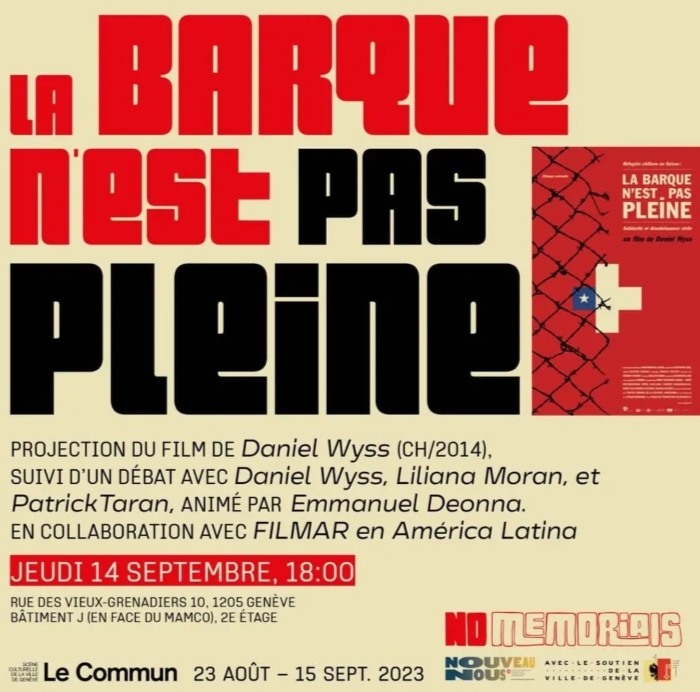
- Patrick Taran, GMPA President, was invited speaker at the University of Chile-FASIC conference Human Rights 50 years since the coup d’etat, Contemporary Perspectives, in Santiago de Chile on 9 August. See Radio Universidad de Chile video-interview; Universidad de Chile Noticias article ; Interview on El Ciudadano (‘the Citizen’) news site.
- The GMPA Assembly of Members 2023 was held in Geneva on 13 June, providing a forum for assessment of key challenges in the world of migration; new members were inducted, prior year activity and financial reports approved, and priorities identified for forthcoming work. See Summary of GMPA Assembly Proceedings.
- Patrick A. Taran, GMPA President, was speaker at the Global webinar held 2 March 2023 on Social Justice: Migration Justice, Racial Justice, and Health Justice, organised by CoNGO--the Conference of Non-Governmental Organizations in Consultative Relationship with the United Nations -- the first in a series of six global thematic webinars marking CoNGO's 75th anniversary (see Concept Note). GMPA was a co-sponsor, see poster below. Address text by Patrick Taran: Migration means social justice, inclusion, equality of treatment and health for all.
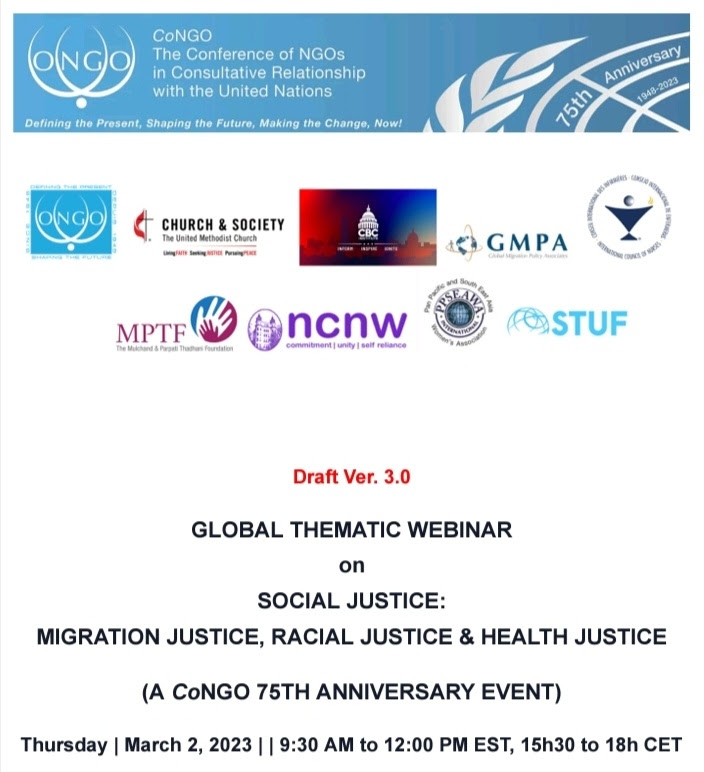
2022
-
Intergenerational Dialogue “Refugees and Migrants in Geneva: Constructing New Lives, from Hopes to Realities” in Geneva 6 December 2022 featured a review of the city’s 500-year history of refuge and immigration and current policy challenges by GMPA President Patrick Taran, along with brief testimonials by 12 immigrants and refugees to Geneva arrived from the 1980s to 2022. It was opened by city Administrative Counsellor Christina Kitsos and Antonio Hodgers, Vice-President of the Council of State of the Republic & Canton of Geneva (see Programme). The context-background brief Geneva: 500 Years of Immigration and Refuge: A History in Brief & Today’s Challenges is posted online in English and French.
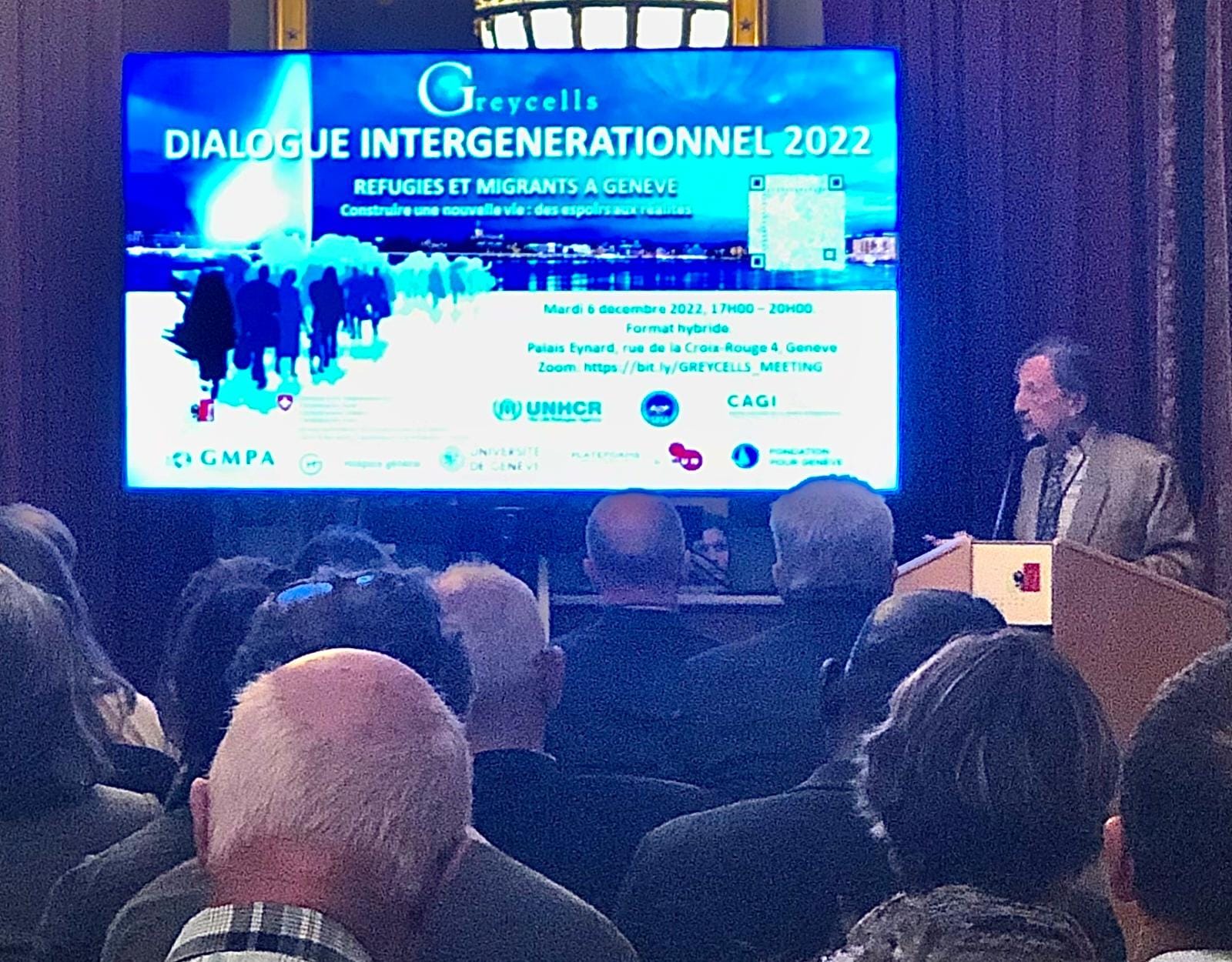
- 24-25 September 2022: KESK, the public services union federation of Turkiye organized the Symposium on War, Migration, Refugees and Labour Issues in Turkiye, Istanbul 24-25 September 2022. The event brought together leadership and activists in national and local public services unions around Turkiye including affiliates in education, health, local administration, agriculture and other sectors, with international participation from ITUC, Arab Trade Union Confederation, Public Services International, and national union federations in Germany and Spain as well as the ILO Turkiye office. Patrick Taran, GMPA President, was speaker at the first substantive session, see text here.
- Training on Protection of migrant workers and their families in and from the IGAD region countries, Entebbe, Uganda, 22-26 August 2022, organized by the International Training Center of the ILO (ITC ILO) and Intergovernmental Authority for Development ( IGAD). Patrick Taran, GMPA President, served as lead trainer, expert resource person and co-facilitator for the comprehensive, integrated participatory training, learning and experience sharing exercise. It was tailored to on-site participation of 40 migration focal points from the seven IGAD (Intergovernmental Authority for Development) countries: Djibouti, Ethiopia, Kenya, Somalia, South Sudan, Sudan and Uganda. The event was organized by the ITC ILO (International Training Center of the ILO at Turin) as part of an ongoing Diploma Course for IGAD member-country migration focal points, it was held under auspices of the ILO-IGAD Free Movement of Persons and Transhumance in the IGAD Region project supported by the EU. See news story on IGAD website and GMPA Twitter for daily reports and photos tweeted by IGAD. Patrick Taran prepared a 35-page resource brief The Global and African Legal Normative Frameworks and Policy Guidance on protection of migrants and migration governance for participants to retain as a resource document for their ongoing work.
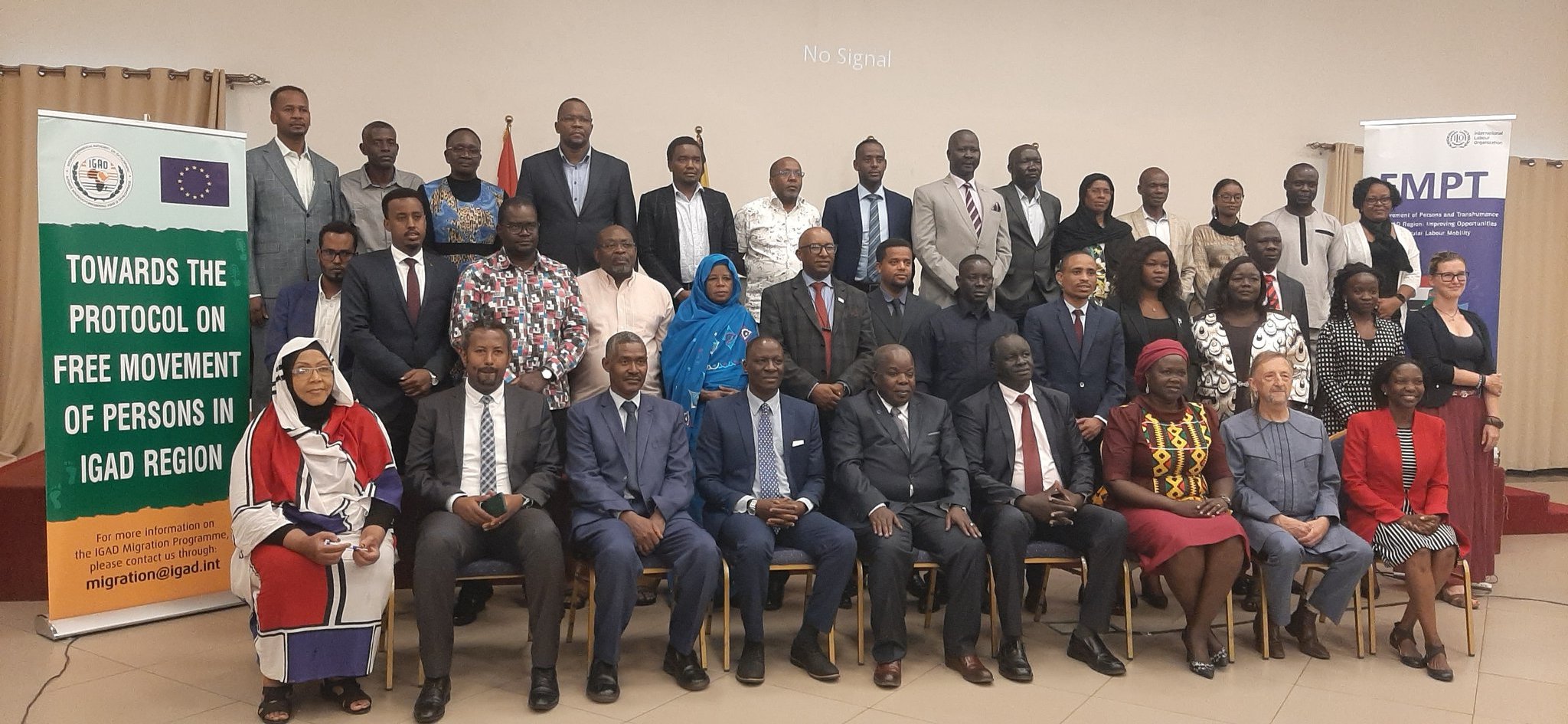
Photo: Participants of the Training. Photo credit: IGAD
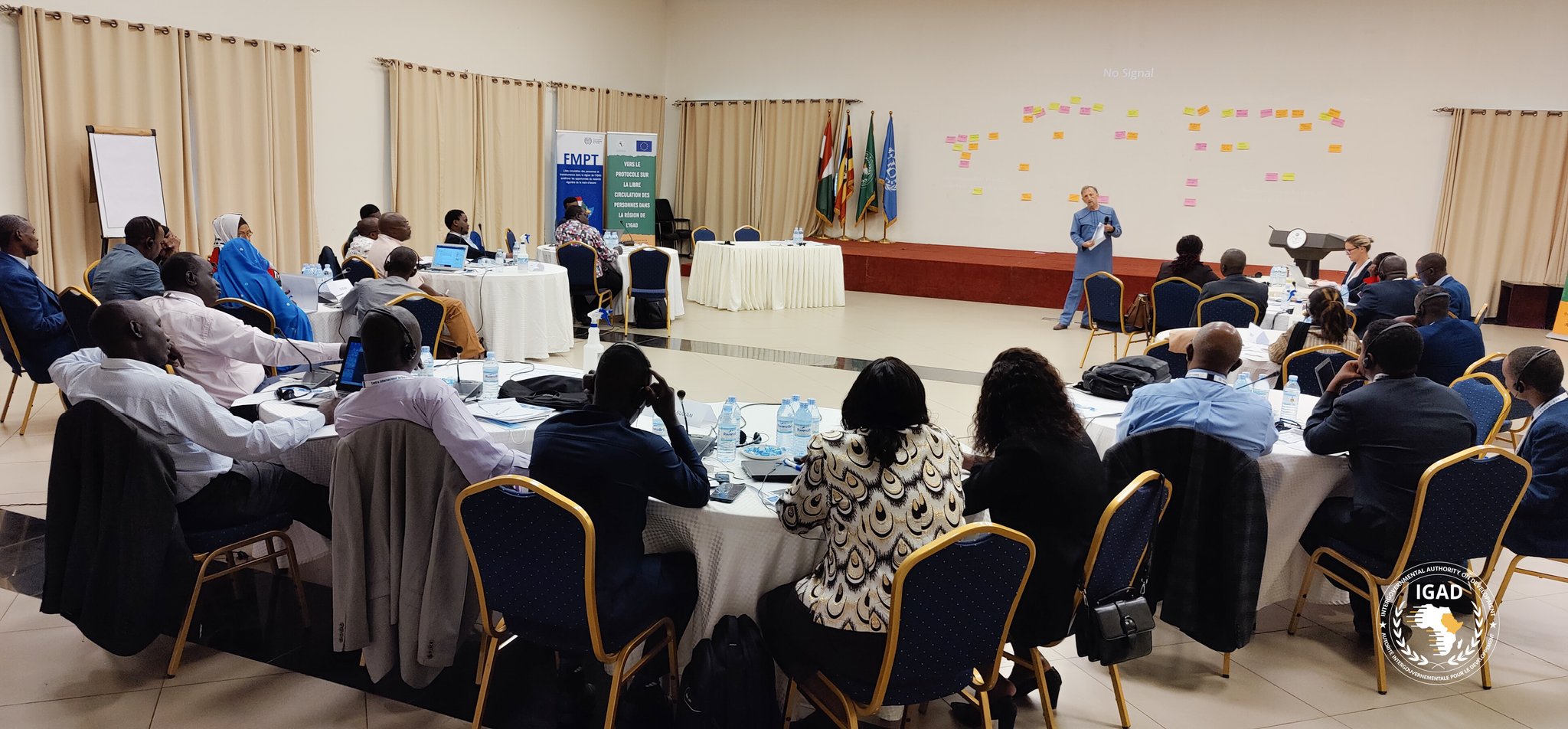
Photo: Patrick Taran - trainer with the course participants. Photo credit: IGAD
- Global Parliamentary Conference on refugees and migration, Istanbul, 20-21 June 2022, organized by the Inter-Parliamentary Union - IPU and the Grand National Assembly of Türkiye (GMPA participation), the first global parliamentary conference focusing on refugees and forced migration. Some 300 parliamentarians participated including speakers of parliaments from nearly 50 countries as well as officials of international and regional organizations. The event opened with a video address by the host country President Mr Erdogan. Throughout the two days, parliamentarians from all regions --Africa, Asia, Europe, Eurasia, the Middle East, and North and South America-- shared the situations their countries face, debated how to address causes of compelled migration, called for cooperation and responsibility-sharing, and urged adoption and implementation of binding international instruments, notably the International Convention on the Protection of the Rights of All Migrant Workers and Members of Their Families (ICRMW). The Global Compact on Refugees and the Global Compact on Migration and their implementation were a focus of discussion. GMPA President Patrick Taran served as speaker, session moderator, and shadow rapporteur. The rapporteur report ( English / French ) presented by Joseph Osei-Owusu, First Deputy Speaker of the National Assembly of Ghana provides a comprehensive, rights-respecting and ‘people-centered’ global assessment and agenda for parliaments worldwide on matters of refugees, forced displacement, and migration broadly. GMPA Research Associate Denielle Amparado (Philippines) served as scribe for the conference, supporting preparation of the Rapporteur's summary.
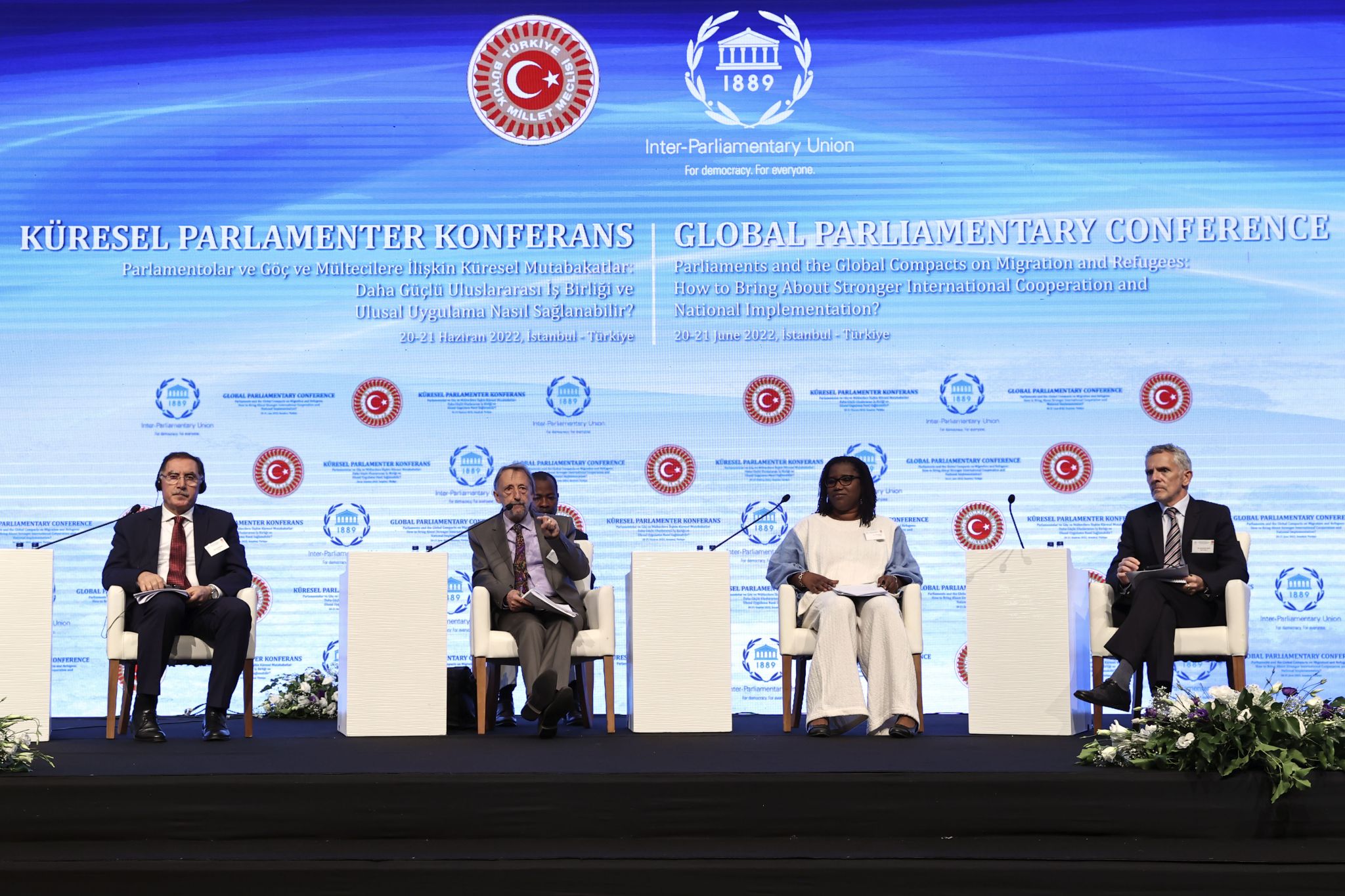
Photo (L to R): Seref Malkoc, Chief Ombudsman, Turkiye; Patrick Taran, President, GMPA (session moderator); Akiyo Afouda, Human Rights Officer, IPU; Dr. Fatima Diallo, Deputy Chair, UN Committee on Rights of Migrant Workers; Gerard Karl Waite, Chief of Mission, IOM, Turkiye. Session II Global Parliamentary Conference on refugees and migration, Istanbul, June 20, 2022. Photo credit: Serhat Çağdaş - Anadolu Agency.
- The African Union Guidelines on Bilateral Labour Agreements were adopted by African Union Specialised Technical Committee (STC) on Social Development, Labour and Employment, during its session 4-8 April 2022 in Addis Ababa. Background research and drafting of the Guidelines were conducted by GMPA expert specialist team (Patrick Taran, Piyasiri Wickramasekara, Marius Olivier, assisted by Olga Kadysheva and Hiral Hirani) in 2021. (See Activities page). The draft Guidelines were reviewed and vetted for submission to the AU-STC by a formal AU Validation Meeting on 22 July 2021 involving tripartite delegates from 35 member countries reflecting all regions of the continent.
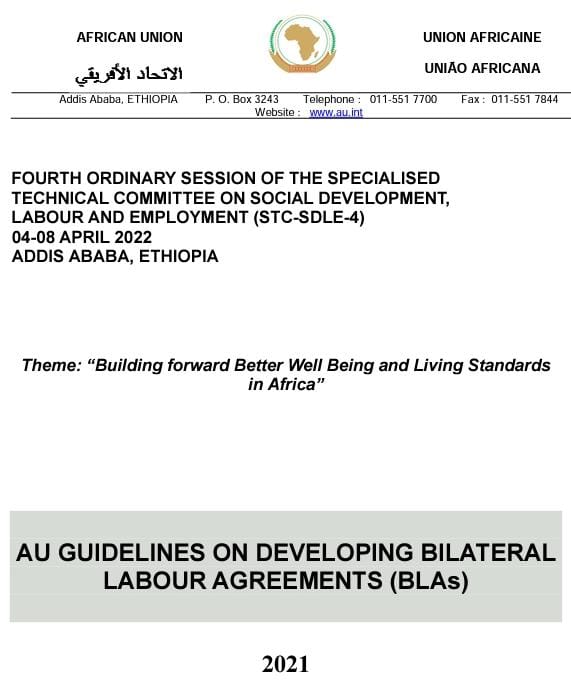
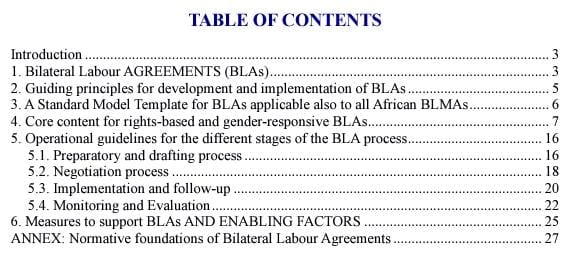
2018
- Launch of the first global manual on migration, health, human rights and HIV & AIDS 'Promoting a Rights-based Approach to Migration, Health, and HIV and AIDS: A Framework for Action', ILO, Geneva, 14 February 2018.
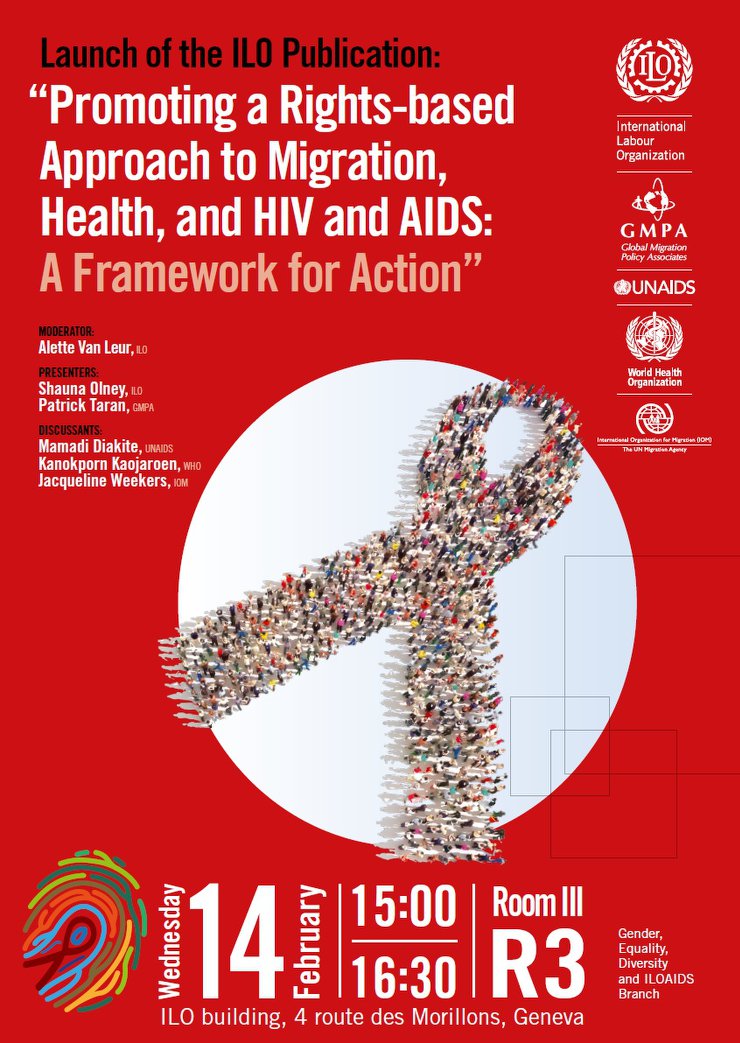
Promoting a Rights-based Approach to Migration, Health, and HIV and AIDS: A Framework for Action is the first ever comprehensive report on the intersection of migration and health – a concern of communities and countries worldwide. More than a report, it lays out – for the first time – the full 'integrated policy agenda' for action and cooperation to enable all migrants' rights to health and to ensure healthy communities everywhere. The report provides detailed attention to HIV and AIDS and other disease risks faced by migrants, proposing globally applicable migration and public health policy responses and practical action. It features a large collection of 'good practice' examples showing what communities, governments, NGOs and other actors are doing to implement the integrated migration, health and HIV agenda.
The publication was prepared by Patrick Taran, with the assistance of the GMPA team including Arnaud Bertin, Fangzhou Liang, Beier Lin, Gabriela Neves de Lima, Evalyn Tennant, and Marie Ullmann, and finalized by Margherita Licata at the ILOAIDS Branch. Technical support and guidance provided by Ryszard Cholewinski, Adrienne Cruz and Anna Torriente (ILO); Paola Pace and Jacqueline Weekers (IOM); Nina Yi Sun (UNAIDS); Chris Castle (UNESCO); and Matthew Cogan (UNFPA).
ILO (2017). Promoting a Rights-based Approach to Migration, Health, and HIV and AIDS: A Framework for Action; International Labour Office – Geneva: ILO, 2017. 128 pages.
The launch event was co-organized by the GMPA team in collaboration with ILO. Moderator: Alette Van Leur (ILO); Presenters: Shauna Olney (ILO) & Patrick Taran (GMPA); Discussants: Mamadi Diakite (UNAIDS) & Jacqueline Weekers (IOM). News coverage of the launch event: UN TV: 1.57 minute story posted on UN AV library, IOM: IOM Joins Launch of ILO Publication Promoting Rights-based Approach to Migration, Health and HIV, AIDS. Photos on GMPA Facebook
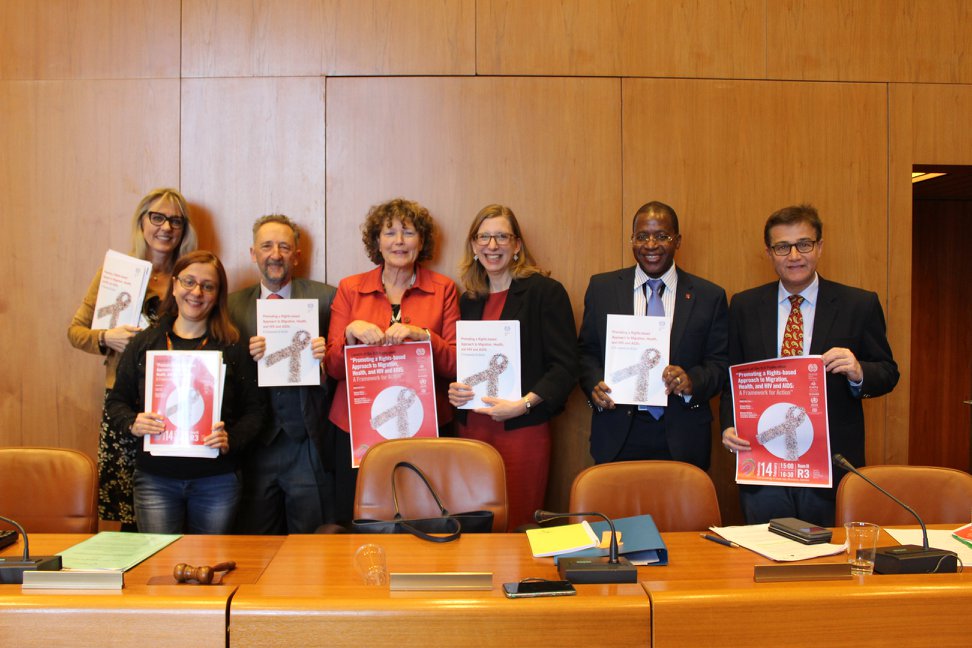
Photo: launch event speakers and co-organisers (L to R): Jacqueline Weekers (IOM), Margherita Licata (ILO), Patrick Taran (GMPA), Alette Van Leur (ILO), Shauna Olney (ILO), Mamadi Diakite (UNAIDS), Syed Mohammad Afsar (ILO). Photo by Olga Kadysheva/GMPA
2017
4th WORLD FORUM ON INTER-CULTURAL DIALOGUE (WFICD)
Co-organized by UNESCO, hosted by the Government of Azerbaijan
Baku, Azerbaijan
5-6 May 2017
PANEL ON CITIES, MIGRATION AND INTER-CULTURAL DIALOGUE –
ROLES OF MUNICIPAL AUTHORITIES
A 90 minute panel discussion session held 5 May, organized by UNESCO with GMPA cooperation.
Programme:
Moderator: Mr Charaf Ahmimed, Programme Specialist at the UNESCO Harare Office.
Speakers:
Thomas Rajacovics, Head of Department and Spokesperson for Integration and Interfaith Dialogue at the Mayor’s Office of the City of Graz, Austria
Dra. Carmen Parra Rodríguez, Directora de la Cátedra de Economía Solidaria, Universitat Abat Oliba CEU, Barcelona
Patrick Taran, President, Global Migration Policy Associates, Geneva. Lead author, UNESCO book: "Cities Welcoming Refugees and Migrants"
Sahib Rahimov, Deputy Minister for Refugees and IDPs, Government of Azerbaijan
Proceedings
Three substantive presentations covered experiences, assessments and lessons from a Graz, Austria local government official and by an academic practitioner from Barcelona, Spain, along with a contextual overview on migration, cities and inter-cultural dialogue drawing on the UNESCO-ECCAR-GMPA study publication. The final presentation outlined Azeri government concerns and action focussed on the reception mainly in cities of some one million internally displaced persons.
2016
MEDIA LAUNCH OF FLAGSHIP BOOK:
CITIES WELCOMING REFUGEES AND MIGRANTS
AT THE ATHENS HIGH LEVEL MEETING ON REFUGEES AND MIGRATION
22 NOVEMBER 2016
An integral part of the Athens High Level Meeting on refugees and Migration 22 November 2016 was the press launch of the publication “Cities Welcoming Refugees and Migrants: Enhancing effective urban governance in an age of migration”. The book is the first tangible output and a flagship product of the UNESCO-ECCAR-Vardoniyannis Foundation partnership.
Researched and authored by Global Migration Policy Associates Patrick Taran, Gabriela Neves de Lima and Olga Kadysheva, it contains a thorough mapping and analysis of issues, experiences and responses by cities across Europe to refugee arrivals and immigration. The publication drew upon research carried out in collaboration with ECCAR member cities, including responses by 21 ECCAR member cities to a detailed survey. The study highlighted the diverse impacts of inflows of refugees and immigration on cities and identified housing, education and employment as the three biggest challenges for city administrations. The book identified a common governance policy and practice framework implemented by cities across Europe.
Some 50 journalists and observers attended the press conference launch, including local, national and international radio, television and print media reporters.
Director General Irina Bokova offered opening remarks highlighting the commitment of UNESCO to upholding the protection of human rights and social inclusion of all persons everywhere, especially in cities and urban settlements where most refugees and migrants reside. “Rising cultural diversity in cities is a reality – this requires new policies, to empower every woman and man, including migrants and refugees. This requires a new commitment by all to counter all forms of discrimination, to respond to hatred and violence, to defend human rights and meet all international obligations,” declared the Director-General. She concluded by lauding the importance and quality of the book.
Marianna Vardoniyannis, President of the M.V. Vardoniyannis Foundation, underscored the urgency of protecting refugees and ensuring dignity and decent treatment for newcomers to our cities. She highlighted Foundation support for the UNESCO-ECCAR cities welcoming refugees programme to contribute to more organized, efficient and humane treatment of refugees based on respect for human rights in municipalities and cities across Europe. Ms Vardoniyannis reminded of the “We Care - Refugee Child Medical Assistance", initiative by the Foundation that has provided medical care, vaccines and psychological support to hundreds of children of the refugees in Greece.
Lead co-author of the book, Patrick Taran, provided an overview of the context for producing the book and then outlined the main features of the report. He noted that most cities worldwide count large immigrant and refugee components among their populations. In a Europe of ageing populations and declining work forces, immigration sustains cities and their industries, services and economic activity. He emphasized the book's “world first” pioneering examination of what cities experience and how they respond to migration across an entire region. He highlighted the remarkable commonality in city government values and policy approaches to migration across Europe. These emphasize inclusivity for all city residents, provision of services for all, equality of treatment, and facilitating participation and integration of refugees and migrants into city economies, civic governance and community life.
THE EXPERT MEETING
CITIES WELCOMING MIGRANTS AND REFUGEES
ATHENS, 23 NOVEMBER 2016
Within the framework of their ongoing partnership, UNESCO, the Marianna V. Vardinoyannis Foundation and the European Coalition of Cities against Racism (ECCAR) convened an Expert Meeting on 23 November 2016 in Athens, Greece following the Athens High Level Meeting on 22 November. GMPA assisted in organizing and preparing the Expert Meeting; GMPA colleagues Gabriela Neves de Lima and Patrick Taran spoke during the meeting.
The Expert Meeting was convened in support of local governments on the front lines in the reception of refugees and migrants, in context that some 80 percent of all refugees and migrants live in cities and urban settlements. Nearly half of the total population of international migrants (244 million worldwide in 2015) resides in ten highly urbanized, high-income countries, of which five are in Europe.
Some 40 experts including city government officials from around Europe and elsewhere (Canada and the USA) participated. The meeting was opened by a panel session with seven mayors from cities around Greece. The Expert Meeting advanced preparation of a practical Handbook and a local governance framework to better equip municipal authorities and key stakeholders with knowledge and capacity for reception, inclusion and integration of refugees and migrants. The Handbook will provide hands-on practical advice on implementing a human rights-based and gender-sensitive urban agenda welcoming refugees and migrants. A GMPA team researched and drafted the handbook over the course of 2017; it will be published in early 2018.
BOOK LAUNCH
Migrants and Refugees Have Rights; impact of EU policies on accessing protection
EUROPEAN PARLIAMENT
Brussels, 22 March 2016
(A Caritas Europa report 'made in GMPA')
The launch event was hosted by MEP Cecila Wikström (Sweden) and included remarks by four MEPs as well as by Shannon Phlomann, Advocacy Officer, Caritas Europe and Patrick Taran, lead author of the book.
«This report is Caritas Europa’s studied response to the tragedy hundreds of thousands of women, men and children face when seeking refuge in Europe. People escaping war, repression and violation of human rights turn to Europe in the hope of finding a safe haven, but instead meet with denial of protection and rejection of solidarity. With this report, Caritas Europa wants to contribute to this political debate and propose solutions to the ongoing tragedy of migration. It is based on the experiences of Caritas organisations across Europe working to secure protection and human rights of migrants and refugees. The stories and testimonies of those who make it to Europe demonstrate the urgency of the situation.”
The report was researched and written by Patrick Taran with Evalyn Tennant, and GMPA researchers Arnaud Bertin, Beier Lin, Lily Erikson and Fangzhou Liang
2015
INFORMATION STAND, BRIEFING PAPERS and BOOK LAUNCH
133rd ASSEMBLY, INTER-PARLIAMENTARY UNION (IPU)
Geneva, 18-21 October 2015
The main discussion theme of the 133rd Assembly was the imperative for fair, safe and humanitarian migration. The launch of the long-in-preparation IPU-ILO-OHCHR Handbook on migration, human rights and governance was also scheduled. The IPU contracted with GMPA (via Patrick Taran) to prepare and staff and information to provide information on migration and encourage delegate interest in and action on ratification of the International Convention on rights of migrant workers. The Assembly debated and adopted a declaration
In brief, GMPA colleagues prepared:
- two background briefing notes for the Assembly, one on main issues and an agenda for parliamentarians, the other on migrant women;
- a flyer announcing the handbook and a text summarizing the handbook content; and
- a set of interview questions for parliamentary delegates.
- GMPA Research Associates Arnaud Bertin and Beier Lin together with Patrick Taran provided booth staffing 'full time' during the four days of the Assembly 18 to 21 October.
- We conducted extended conversations with delegates or delegations of 12 countries and spoke briefly with in total some 200 delegates.
- Patrick Taran moderated a panel discussion session on refugee protection of the IPU Committee on International Humanitarian Law, on Tuesday, 20 October.
- GMPA staff transposed delegates cards sign-ins onto an excel spread sheet to facilitate and monitor IPU followup.
BRIEFING ON MIGRATION AND RACIAL DISCRIMINATION AT THE COMMITTEE ON THE ELIMINATION OF ALL FORMS OF RACIAL DISCRIMINATION
Friday 14 August 2015, Palais des Nations (Salle VII)
Topics & Panellists:
- Liz Feteke (Executive Director, Institute of Race Relations)
When solidarity fails: the consequences of the relocation crisis - John Wrench (Visiting Professor, Norwegian University of Science and Technology)
Raising awareness of the problem of discrimination against migrants and minorities in employment in Europe - Patrick Taran (President, GMPA)
On the intersectionality between discrimination against migrants, all forms of racial discrimination and xenophobia
MIGRATION: CRISIS OF VALUES AND GOVERNANCE
HUMAN RIGHTS, SOCIAL COHESION, WOMEN DEVELOPMENT
Panel Dialogue Event at the 29th Session of the Human Rights Council
Wednesday 24 June 2015, Palais des Nations (Salle VIII)
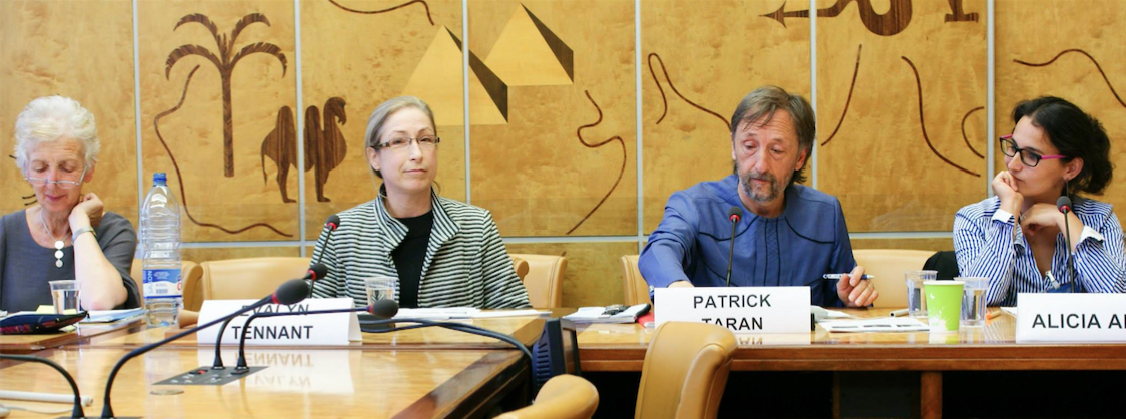
A participatory event highlighting key synergies and mutual dependencies among human rights, international migration, advancement of women equality and the development agendas, including the Beijing +20 Review process and the post-2015 UN Development Agenda. This stimulated dialogue and cooperation is an attempt to make common cause across intersecting concerns, constituencies and networks to shore up the rights-based approach to governance, equality and non-discrimination. The event was jointly organized by GMPA, the Arab Women's Solidarity Association-Belgium, Bangwe et Dialogue, European Network of Migrant Women, International Council of Jewish Women, Medical Care Development International, NGO Committee on the Status of Women geneva and the Rwanda Women Network.
HUMAN RIGHTS AND MIGRANT WOMEN
PANEL AND WORKING GROUP DISCUSSION
Side event in the 59th Session of the Commission on the Status of Women
Wednesday 11 March 2015, CCUN Chapel, New York
(Organized by Young Leader Caucus in partnership with GMPA)

Agenda and panelists:
- Alicia Arbid (Arab Women's Solidarity Organization - Belgium, European Network of Migrant Women)
- Melissa Garcia Velez (New York State Youth Leadership Council)
- Dylan Terry (Young Leaders Caucus, Global Migration Policy Associates)
- Roksana Mun (DRUM - South Asian Organization Center)
MIGRANT WORKERS AS PROMOTERS OF GLOBAL GOVERNANCE: THE NEXUS OF JUST DEVELOPMENT AND MIGRANT LABOUR RIGHTS
Sunday 7 December 2014, Mandela Hall
(Organized by GMPA in cooperation with Brot Für Die Welt & German Commission for Justice and Peace)
Speakers:
- Eunice Dhadhla (Assistant General Secretary, South African Domestic Services and Allied Workers Union - SADSAWU)
- Nicola Piper (GMPA, University of Sydney)
- Christal O. Spel (Research fellow of Social and Public Policy, University of Helsinki)
- Sophia Wirsching (Bread for the World, Germany)
- Hildegard Hagemann (German Commission for Justice and Peace, Germany)
METROPOLIS 2014: GLOBAL MIGRATION POLICY WORKSHOPS - LABOUR MIGRATION GOVERNANCE, NEW INITIATIVES IN POLICY AND PRACTICE
Thursday 6 November 2014, 11 Milano
Labour Migration Governance: New Initiatives in Policy and Practice
(2:00 - 3:30 pm / White Room 04)
International labour and skills mobility is the defining feature of migration today, driven by globalization, technological change and evolving demographics. Despite comprehensive normative, policy and institutional frameworks set in place over the last century, governance of labour migration is widely characterized by absence of protection for migrant workers, counterproductive policies and control by institutions lacking relevant competencies. Nonetheless, innovative and effective responses are emerging; this workshop highlights several.
- Alain Desmond (European Inter-University Center for Human Rights and Democratization)
Normative migration governance instruments and the role of civil society in promoting them: the case of ICRMW. - Katherine Youtz (Paris School of International Affairs - Sciences Po)
Nigeria and international migration: mapping international commitment in domestic law and policy. - Olga Kadysheva (Financial University Under the Government of the Russian Federation)
New and old policy responses to labour migration in Russia. - Patrick Taran (Global Migration Policy Associates)
The AU-ILO-IOM-ECA Africa labour migration governance and programme.
Migration in MENA: Business as Usual or New Openings for Decent Treatment?
(4:00 - 5:30 pm / Blue Room 02)
Migration is the zone of contention over whether development in MENA countries will continue to rely on abusive exploitation of foreign workers or whether real changes in policy and practice evolve. The panorama across the region spells continuing abuse and exploitation for millions of migrants. While “nationalization” of employment is proclaimed as solution, no State in the Gulf region can get far in reducing dependency on foreign labour. This workshop proposes a tour of conditions, crises and new developments to identify ways forward on law, policy, human rights and labour migration governance.
- Patrick Taran (Global Migration Policy Associates)
MENA migrations: upheavals, disintegrating states, dependency on foreign labour, whither governance? - Ray Jureidini (Hamad Bin Khalifa University)
Labour recruitment charges from Asia to the Gulf: the origins of corruption, forced labour, debt bondage and trafficking. - Piyasiri Wickramasekara (Global Migration Policy Associates)
Migration governance challenge in a middle income country: the Jordanian experience. - Dylan Terry (Paris School of International Affairs - Sciences Po)
Palestinian Rights to Work in Lebanon: Advances and Gaps.
12th RHODES FORUM 2014 DIALOGUE OF CIVILIZATIONS
ROUNDTABLE: MIGRATION: REBUILDING THE WORLD, CHALLENGING CIVILIZATIONS
Saturday 27 September 2014, Rhodes
The migration workshop addressed human mobility as a major global phenomena and a significant vector of dialogue among peoples, nations and civilizations worldwide. Nine experts from diverse realities of Canada, India, Moldova, Portugal, the Russian Federation and the USA presented data, analysis and practical examples on contemporary migration challenges and governance responses. The animated exchange focused on three themes: mobility of labor and skills to maintain viable economies, lessons learned on integration of migrants for social cohesion, and effective responses to the mass refugee influx from the Ukraine into Russia.
The dialogue highlighted that migration today is mainly international labour and skills mobility which is increasingly necessary to maintain productive work forces and viable economies in industrialized countries due to evolution of technology, changes in the organization of work, and demographic decline of work forces in many countries. Reports on evolution of policy in the United States, recent legislative developments in the Russian Federation, and experiences from Bangladesh, India and Nepal helped identify global policy challenges and viable response measures.
Particular attention was focused on governance measures to protect and assist the estimated influx of 800,000 Ukranians into Russia since June of this year. Discussants identified options for providing legal status for Ukranians in refugee-like situations. Others enumerated the policy agenda of measures to facilitate integration of migrants based on successful experiences in Europe and the USA.
The workshop concluded that the dialogue on migration and its effective governance in context of intensified international and intercultural tensions is an ongoing work in progress and that it will remain an integral component on the agenda of dialogue of civilizations-- at local and national levels as well as globally.
The workshop was co-moderated by Lidia Grafova, President, International Public Association “Forum of Migration Organizations (Russian Federation) and Patrick Taran, President, Global Migration Policy Associates (Geneva). Expert speakers included: Jana Costachi (Moldova), Julia Florinskaya (Russian Federation), Pedro Gois (Portugal), Andrei Korobkov (USA), Jayshree Sengupta (India), Lisa Simeone (USA), Ray Taras (Canada), Olga Vorobyeva (RF), and Zhanna Zayonchkovskaya (RF). Olga Kadysheva (RF) was co-organizer.
GMPA OPEN HOUSE - MIGRATION NETWORKING: RECEPTION
Wednesday 6 November 2013, 11 Avenue de la Paix
Marking two years of GMPA and welcoming delegates and friends attending the ILO Tripartite Technical Meeting on Labour Migration...
HUMAN RIGHTS AND MIGRANT WOMEN
BEIJING +20 GENEVA NGO FORUM
UN ECE Regional Review
Tuesday 4 November 2014, Palais des Nations (Salle IX)
(Interactive roundtable organized by the NGO CSW Geneva and GMPA)
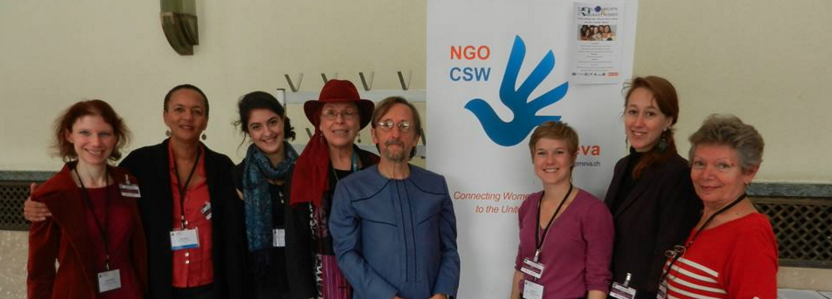
Conveners:
- Joyce Jett (International Representative, Medical Care International and Solar Cooker's International)
- Colette Samoya (Founder, BANGWE - Founder, Dialogue)
- Patrick Taran (President, Global Migration Policy Associates)
Speakers:
- Krishna Ahooja-Patel (International Representative, Women's International League for Peace and Freedom)
- Gloria Moreno Fontes (Senior Labour Migration Specialist, ILO)
- Patrick Taran (President, Global Migration Policy Associates)
- Monica Cristea (Board Member, European Network of Migrant Women)
- Nunu Kidane (Director, Priority Africa Network)
WORLD PUBLIC FORUM DIALOGUE OF CIVILIZATIONS, RHODES - 2013
THE NEW MIGRATION CHALLENGES: THE CONTEMPORARY WORLD
Friday 4 October 2013, Leros Hall, Rhodes, Greece
(Discussion event organized with support from GMPA)
A Round Table to enhance harmonization of international relations and promotion of global stability. Specific purposes: to find paths to overcome migration challenges and risks; to balance interests of migration partner countries, migrants and receiving societies; and to identify good policies and practices for migration governance, integration of migrants and international cooperation in the field of migration. Speakers included academicians, researchers, practitioners, former government officials and recognized experts from the Russian Federation, Kazakhstan, Moldova as well as Austria, the Netherlands, Portugal and the USA. See program for speakers and topics.
Main panel themes included:
- Economies, Labour Markets, Demography and Mobility: Global Realities
♦ What needs for migrant skills and labour during economic cycles today (growth, downturns, recovery)?
♦ Unemployment and migrant flows: how to reconcile sometimes contradictory trends?
♦ How does the migration policy in different countries change as a response to the forthcoming economic crisis? - Migration and Societies: Adaptation and Integration
♦ Which categories of migrants need integration and which adaptation?
♦ Integration of migrants: universality of "western values" or transformation of western societies?
♦ How to resolve key issues for host societies: discrimination, xenophobia, tolerance, equality of treatment, integration? - Governance: Challenges, Mechanisms, Good Practices
♦ Migration governance: how to balance, interests of countries of destination, countries of origin, receiving societies and migrants?
♦ What are roles and responsibilities of government, employers and civil society in addressing migration?
♦ What innovations in the field of migration governance and integration of migrant deserve consideration and dissemination?
GLOBAL MIGRATION, MIGRANTS HUMAN RIGHTS: PRINCIPLES & ACTION
WORKSHOP FOR POLICY, STRATEGY AND ORGANIZING
in PGA (Peoples Global Action) UN High Level Dialogue on Migration and Development
Friday 4 October 2013, Church Center of the UN (CCUN)
A strategic workshop summing up issues and activity, affirming common principles, and developing cooperation, coordination, and campaigning to realize the rights based agenda on migration, building on the call to reaffirm that a rights-based framework should be the primary framework for national as well as international discourse and action on migration. This workshop explores the range of concerns and actions conducted by civil society and seeks to enhance collaborative responses in defense of migrants’ human and labour rights. Cosponsors : Global Migration Policy Associates with Amnesty International; BWI-Building and Woodworkers International Union; Centro de Derechos Humanos, Universidad Nacional de Lanús (Argentina); DRUM-South Asian Organizing Center; GAATW-Global Alliance Against Trafficking in Women; Observatory Caribbean Migrants; International Detention Coalition; ITUC-International Trade Union Confederation; PANiDMR-Pan-African Network in Defense of Migrants Rights; PICUM-Platform for International Cooperation on Undocumented Migration; PSI-Public Services International; Women and Global Migration Working Group (WGMWG). Speaker participants included: Kate Sheill GAATW, Chidi King ITUC, Francesca Pizzutelli, Amnesty International, Ben Lewis, International Detention Coalition, Carol Barton WGMWG; Nunu Kidane of PANiDMR moderated the event.
WORLD SOCIAL FORUM ON MIGRATION, MANILA
GLOBAL MIGRATION POLICY WORKSHOPS: A TRILOGY UNDERSTANDING REALITIES, DEFENDING MIGRANTS, PROMOTING GOVERNANCE BY AND FOR ALL
26-30 November 2012, Manila
Three complementary “round-table” workshop sessions following the main themes of WSFM 2012 intended to tell the whole story, build the narrative and trace the roadmap on global migration, human rights, social participation and governance of migration today and tomorrow:
Agenda:
Workshop 1: Migration Today: Global Realities, Crises, Impact and Consequences
Moderator: Patrick Taran (President, GMPA)
- Raul Degado-Wise (Coordinator, Red Migraciones y Desarollo)
Global migration: vital importance to economies and societies: the real stories - Bandana Patanaic (Director, Global Alliance Against Trafficking in Women)
Migrant experiences and consequences - William Gois (Regional Coordinator, Migrant Forum in Asia)
Migration transforming nations and societies: identities, diversity and social cohesion - Marla Asis (Scalabrini Migration Centre)
Migration stakeholders: who, why and how?
Workshop 2: Human Rights, Rule of Law, Defending Migrants and Building Alliances
Moderator: Nicola Piper (Vice President, GMPA)
- Patrick Taran (President, Global Migration Policy Associates)
Migration, human rights and the rule of law: why the construct and how it works - Abdelhamid El Jamri (Chairman, UN Committee on Migrant Workers)
The Conventions on migrant rights: effects, implementation and supervision - Badara Ndaiye (Pan-African Network for Development and Rights)
Migration today in regional free movement regimes: an African experience - Eve Geddie (Platform for International Cooperation on Undocumented Migration)
Alliance building, working together, building pressure: defending the undocumented
Workshop 3: Organizing for migration governance for rights, democratic participation and well-being
- Patrick Taran (President, Global Migration Policy Associates)
Revitalizing the global architecture of governance: beatin back the deregulatory assault - Pia Oberoi (OHCHR Bangkok)
Resurrecting global commitments: Cairo, Copenhagen, Beijing, Durban, Geneva - Sophia Wirsching (Migration Officer, Brot Für Die Welt)
New challenges, new allies: environment, climate change, cities, communities - Jin Sook Lee (Migration Officer, Building and Woodworkers International Union)
Framing the issues: reconstructing the architecture
AN INFORMAL CONVERSATION ON INTERNATIONAL MIGRATION, HUMAN RIGHTS AND GOVERNANCE
Thursday 27 September 2012, World Ecumenical Centre (Salle IV)
(Arranged by GMPA in cooperation with OHCHR)
A workshop to trace a roadmap on global migration, human rights and the governance of migration:
- Summarizing knowledge and analysis on migration today, contexts, challenges, stakeholders
- Addressing migration and human rights: vulnerabilities and protection gaps
- Assessing the existing system of migration governance: international standards, institutional roles, stakeholders agendas and governance dialogue spaces
- Imagine rights-based and participatory governance of migration
Agenda:
- Session 1: Migration Today: Global Realities, Crises, Impact and Consequences
Starting the discussion by setting the stage and the context - Session 2: Human Rights, International Standards: the Rule of Law Foundations for Protection and Governance
The normative framework of international law, rules, processes - Session 3: Reviewing the Global Architecture of Governance on Migration
Clarifying what we're talking about, and doing an annotated inventory of what exists - Session 4: The Future of Global Migration Governance
Identifying areas for action and brainstorming to clarify key issues, remedies and possible approaches
GLOBAL MIGRATION POLICY SYMPOSIUM:
DISCRIMINATION & XENOPHOBIA: MODERN DAY SCOURGES
vs. WINNING HEARTS AND MINDS FOR MIGRANTS
Wednesday 20 June 2012, Palais des Nations (Salle XXVII)
Two complementary "round-table" presentation and discussion sessions:
- Outlining data, challenges and responses to discrimination and xenophobia against migrants
- Obtaining positive public perceptions of migrants and migration in an increasingly mobile world
Rising discrimination and xenophobia against migrants/foreigners threaten social cohesion as well as lives around the world. Meanwhile, news media, public discourse and political campaigns in the North and South are dominated by imagery of migrants and migration threatening security, society and the very identity of nations. Yet economic, demographic and technological trends are increasing dependency of countries worldwide on foreign skills and labour, making human mobility a predominant feature of contemporary globalization. What is the extent of discrimination and xenophobia today, and how much a threat to individuals and societies? What is the reality of migrants' impact on societies? Why, despite increasing needs for skills and labour mobility, are attitudes and treatment towards migrants increasingly hostile? How can public attitudes and political discourse be altered to ensure human security and social cohesion? These urgent issues confronting national governments, local authorities, civil society, migrant communities and international organizations will be debated at this symposium, taking place in context of the UN Human Rights Council and International Labour Conference in Geneva.
MINI SYMPOSIUM: MIGRATION, FAMILY AND HUMAN RIGHTS
Tuesday 24 April 2012, Palais Wilson (Committee Meeting Room)
(Arranged by GMPA in cooperation with OHCHR & the Steering Committee)
A "round-table" presentation and discussion of conditions, challenges and rights-based responses to supporting family in the context of migration. Despite thousands of years of human migration usually in family groups, family and migration have not been examined together globally in academic, policy or practical terms. A first ever global symposium on migration, family and dignity was held 27-29 March in Doha, sponsored by the Doha International Institute for Family Studies and Development.
Projections of increasing worldwide labour and skills mobility in context of often restrictive migration policies urge a new look at the complex web of issues, connections and challenges in the nexus between contemporary migration and family. These include not only issues of family integrity, family unity, and family function in migration destination and origin countries. The family-migration nexus also poses unanswered challenges of social reproduction of work forces, obtaining skills for future viability of economies, and resolving increasing demographic and social security deficits. Changing gender roles and expectations; care, socialization and education of children accompanying migrants or remaining at home when parents migrate; issues of discrimination versus social cohesion also present immediate dilemmas. The impact of policy and governance approaches by national government, local authorities, civil society, migrant communities and concerned international bodies makes the family-migration nexus a direct and immediate concern for all stakeholders.
Format: brief remarks on key migration-family topics by experts and specialists followed by open discussion. Invited: CMW members, concerned officials/staff of international organizations, diplomatic missions, civil society and migrant organizations.
Topics & Panellists:
- Wan-Hea Lee (Human Rights Treaties Division, OHCHR)
Fundamental Family Rights in International Standards - Piyasiri Wickramasekara (Vice President, GMPA)
Migration policy regimes: helping or hindering family? - Blandine Mollard (Gender Issues Coordination, IOM)
Gender considerations for protecting family in migration - Mirela Shuteriqi (Anti-Trafficking, Terres des Hommes International Federation)
Children in migration: accompanying, unaccompanied and remaining behind - Patrick Taran (President, GMPA)
Framing policy and practical responses


